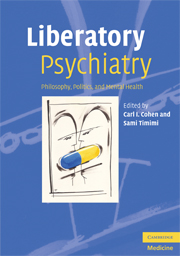Book contents
- Frontmatter
- Contents
- Contributors
- Acknowledgments
- Introduction
- 1 Working towards a liberatory psychiatry? Radicalizing the science of human psychology and behavior
- 2 Power, freedom, and mental health: a postpsychiatry perspective
- 3 Challenging risk: a critique of defensive practice
- 4 Democracy in psychiatry: or why psychiatry needs a new constitution
- 5 German critical psychology as emancipatory psychology
- 6 Psychopolitical validity in the helping professions: applications to research, interventions, case conceptualization, and therapy
- 7 Class exploitation and psychiatric disorders: from status syndrome to capitalist syndrome
- 8 Ecological, individual, ecological? Moving public health psychiatry into a new era
- 9 Children's mental health and the global market: an ecological analysis
- 10 Postcolonial psychiatry: the Empire strikes back? Or, the untapped promise of multiculturalism
- 11 A new psychiatry for a new world: postcolonialism, postmodernism, and the integration of premodern thought into psychiatry
- 12 Neoliberalism and biopsychiatry: a marriage of convenience
- 13 Psychoanalysis and social change: the Latin American experience
- 14 A new psychiatry?
- Index
- References
14 - A new psychiatry?
Published online by Cambridge University Press: 25 August 2009
- Frontmatter
- Contents
- Contributors
- Acknowledgments
- Introduction
- 1 Working towards a liberatory psychiatry? Radicalizing the science of human psychology and behavior
- 2 Power, freedom, and mental health: a postpsychiatry perspective
- 3 Challenging risk: a critique of defensive practice
- 4 Democracy in psychiatry: or why psychiatry needs a new constitution
- 5 German critical psychology as emancipatory psychology
- 6 Psychopolitical validity in the helping professions: applications to research, interventions, case conceptualization, and therapy
- 7 Class exploitation and psychiatric disorders: from status syndrome to capitalist syndrome
- 8 Ecological, individual, ecological? Moving public health psychiatry into a new era
- 9 Children's mental health and the global market: an ecological analysis
- 10 Postcolonial psychiatry: the Empire strikes back? Or, the untapped promise of multiculturalism
- 11 A new psychiatry for a new world: postcolonialism, postmodernism, and the integration of premodern thought into psychiatry
- 12 Neoliberalism and biopsychiatry: a marriage of convenience
- 13 Psychoanalysis and social change: the Latin American experience
- 14 A new psychiatry?
- Index
- References
Summary
If you come here to help me, then you are wasting your time. But if you come here because your liberation is bound up in mine, then let us begin.
Lily Walker, an Australian Aboriginal Women's leaderThe reader of this volume will quickly grasp that there are no general agreements about the form or content of a liberatory psychiatry. This is not surprising since several of the contributors view themselves as postmodernists. Thus, “grand narratives” or universal truths and rules will be avoided. Having said that, we believe that there are some broad agreements about liberatory psychiatry. Although the authors' emphasis may be different, there are at least four themes in which the contributors to this volume are on common ground: (1) the political and psychological sphere are inseparable; (2) dominance and oppression are pervasive within the political sphere; (3) the physical and social world are inseparable; (4) there needs to be an understanding of the interactions between “the general” and “the particular.” We shall review these items below.
A warning light should probably go on whenever complex concepts are combined into one word; however, Isaac Prilleltensky's notion of “psychopolitical” does capture some of the basic concerns of the writers of this volume. Namely, that the political and psychological spheres are inseparable. This means that we cannot explain the development of individuality or subjectivity apart from its political and cultural context, nor can we understand political and cultural structures without considering its psychic dimension.
- Type
- Chapter
- Information
- Liberatory PsychiatryPhilosophy, Politics and Mental Health, pp. 275 - 285Publisher: Cambridge University PressPrint publication year: 2008

